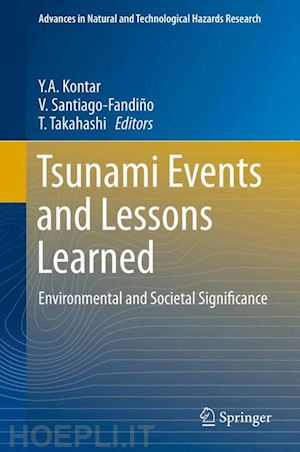
Questo prodotto usufruisce delle SPEDIZIONI GRATIS
selezionando l'opzione Corriere Veloce in fase di ordine.
Pagabile anche con Carta della cultura giovani e del merito, 18App Bonus Cultura e Carta del Docente
This book is a collective effort by world experts, bringing together assorted contributions presented during the Ocean Science Session OS-017, of the AOGS-AGU Joint Assembly held in Singapore in 2012 (the Asia Tsunami and Great East Japan Earthquake and Tsunami events). The chapters cover assessment, evaluation, forecast and lessons learned as well as environmental and societal impacts of the latest tsunamis that occurred in the Indian Ocean in 2004 and the Pacific Ocean in Japan 2011.
The book is aimed at experts, scientists and decision makers seeking recent updated information, knowledge and experiences to better understand, quantify, forecast and protect coastal water resources, ecosystems, communities and human settlements which are often affected by tsunamis.
Preface.- Foreword.- 1. The Tsunami and Earthquake in Miyagi Prefecture and Sanriku 2011-2012 - An Overview.- 2. Assessment and Modeling of Dispersal Contamination Incoming with Submarine Groundwater Discharge (SGD) in Tsunami Affected Coastal Areas.- 3. Tsunami Inundation Modeling of the 2011 Tohoku Earthquake Using Three-dimensional Building Data for Sendai, Miyagi Prefecture, Japan.- 4. Numerical Simulation of Coastal Sediment Transport by the 2011 Tohoku-oki Earthquake Tsunami.- 5. NOAA’s Historical Tsunami Event Database, Raw and Processed Water Level Data, and Model Output Relevant to the 11 March 2011 Tohoku, Japan Earthquake and Tsunami.- 6. Tsunami Simulations in the Western Pacific Ocean and East China Sea from the Great Earthquakes along the Nankai-Suruga Trough.- 7. Impacts of Tsunami Events on Ecosystem Services Provided by Benthic Macro-invertebrate Assemblages of Marine Coastal Zones.- 8. Discussion about Tsunami Interaction with Fringing Coral Reef.- 9. Ecological Status of Sandy Beaches After Tsunami Events – Insights From Meiofauna Investigations After The 2011 Tohoku-Oki Tsunami, Sendai, Japan.- 10. Impact of Tsunami Inundation on Soil Salinisation – Up to one Year after the 2011 Tohoku-Oki Tsunami.- 11. Estimating the 2004 Indian Ocean Tsunami Wave Height and Period from Boulders’ Distribution at Pakarang Cape, Thailand.- 12. A Note on Imbricated Granite Boulders on NW Penang Island, Malaysia-Tsunami or Storm Origin?.- 13. Effects of Tsunami Wave Erosion on Natural Landscapes: Examples from the 2011 Tohoku-Oki Tsunami.- 14. Concatenated Hazards: Tsunamis, Climate Change, Tropical Cyclones and Floods.- 15. Domino Effects and Industrial Risks: Integrated Probabilistic Framework – Case of Tsunamis Effects.- 16. Destruction Patterns and Mechanisms of Coastal Levees on the Sendai Bay Coast Hit by the 2011 Tsunami.- 17. Damage and Reconstruction after the 2004 Indian Ocean Tsunami and the 2011 Tohoku Tsunami.- 18. Tsunami-Deck: ANew Concept of Tsunami Vertical Evacuation System.- 19. Identifying Evacuees' Demand of Tsunami Shelters Using Agent Based Simulation.- 20. Multiple Wave Arrivals Contribute to Damage and Tsunami Duration on the US West Coast.- 21. Improving Tsunami Resiliency: California's Tsunami Policy Working Group.- 22. Preliminary 2013 Solomon Islands Tsunami Data Report and Historical Retrospective.- 23. 2004 Tsunami in Southern Thailand, Lessons Learned for the Thai Communities.- 24. Understanding Challenges at the “Last-Mile” in developing an Effective Risk Communication to Reduce People’s Vulnerability in Context of Tsunami Early Warning and Evacuation.- 25. The Great East Japan Earthquake and Tsunami Aftermath: Preliminary Assessment of Carbon Footprint of Housing Reconstruction.- Index











Il sito utilizza cookie ed altri strumenti di tracciamento che raccolgono informazioni dal dispositivo dell’utente. Oltre ai cookie tecnici ed analitici aggregati, strettamente necessari per il funzionamento di questo sito web, previo consenso dell’utente possono essere installati cookie di profilazione e marketing e cookie dei social media. Cliccando su “Accetto tutti i cookie” saranno attivate tutte le categorie di cookie. Per accettare solo deterninate categorie di cookie, cliccare invece su “Impostazioni cookie”. Chiudendo il banner o continuando a navigare saranno installati solo cookie tecnici. Per maggiori dettagli, consultare la Cookie Policy.